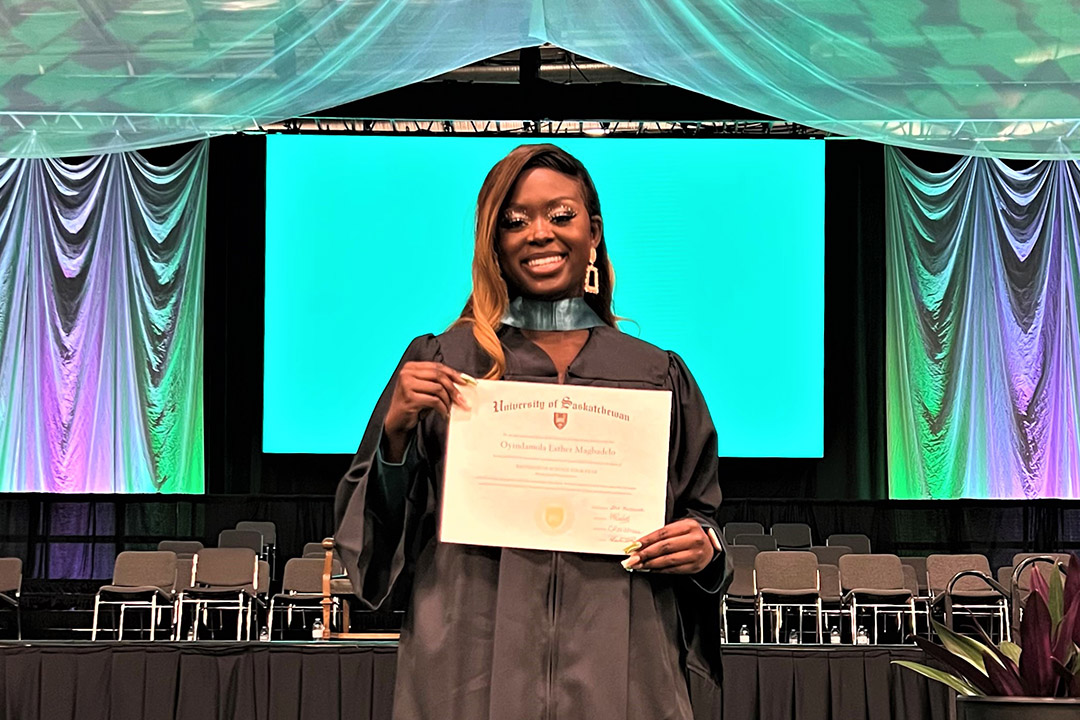
Black student makes history graduating from USask biomedical neuroscience program
As Oyin Magbadelo was finishing up her classes to complete her Bachelor of Science (BSc) in Biomedical Neuroscience, a friend pointed out that Magbadelo achieved more than her degree.
By Kristen McEwen“My friend said, ‘You realize you’re one of the first Black students, and one of the first Black women (in the program),’” Magbadelo said. “I was like ‘Wow.’ In that moment it really hit me that I was potentially making history. And that was a huge wake up call.”
Magbadelo was one of the first Black students to graduate from the new biomedical sciences degree program at this year’s 2022 University of Saskatchewan (USask) Spring Convocation. She also received a minor in psychology.
When realizing she was also one of the first Black women to graduate from the program, Magbadelo reflected on the moment.
“It’s encouraging and motivating to be an example to other women of colour to just take a chance,” Magbadelo said. “You’d be surprised how many opportunities there are for you, but you can overthink or undermine your value.”
Magbadelo’s interest in the biomedical sciences began in biology in high school – specifically the brain and heart.
When applying for programs for post-secondary in 2018, Magbadelo was looking for direct-entry programs that fit her interest in learning more about the functions of the brain and heart. After leaving her hometown of Calgary, Alberta, Magbadelo initially was accepted at USask for the Pharmacology and Physiology program until the new Biomedical Sciences programs opened in 2020.
“I thought, ‘I’m going to take my chances and I’m going to apply to transfer.’ And the funny thing is I applied the day before the admissions deadline because I was focusing too much on not getting in, since there were 40 spots available for neuroscience.”
She soon learned that she was accepted into the program and during the next two years, with the program undergoing some changes, Magbadelo completed her degree.
The revamped biomedical sciences programs are a partnership between the College of Art and Sciences and the College of Medicine. The updated program began in May 2021, with the aim of providing cutting-edge, multi-disciplinary training that will position students for careers in biomedical sciences and health professions.
Now that she’s graduated, Magbadelo is ready to enter the STEM (science, technology, engineering and math) fields.
“It was overwhelming at first,” she said. “But once I crossed the stage, I realized the real work starts now. And I need to do something to make an impact in society.”
Magbadelo is interested in working in clinical neuroscience, possibly as a clinical laboratory technician specializing in neurological disorders.
“My main goal is to really be involved in the research and innovation for finding diseases and treatments related to neurology,” she said.
Magbadelo offered advice for other Black women and people of colour considering applying to biomedical sciences and/or other STEM fields.
“The No. 1 thing is don’t undervalue yourself,” she said. “You’re more talented than you realize. High expectations for yourself can push you (to excel) but at the same time, it can also have you second-guessing yourself. So, be your best critic but also your greatest supporter.”Article re-posted on .
View original article.

